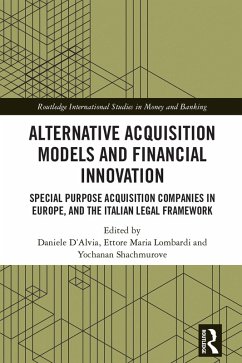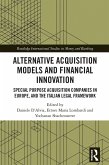Alternative Acquisition Models and Financial Innovation: Special Purpose Acquisition Companies in Europe, and the Italian Legal Framework
offers the most comprehensive overview of the current international financial regulations of SPACs in the EU and UK compared to the main legal system where SPACs originated-the US. This edited book is focused on finding a European legal framework for SPACs by discovering whether the Alternative Investment Fund Managers Directive (AIFMD) or the Undertakings for the Collective Investment in Transferable Securities Directive (UCITS) are applicable to them and why, as well as identifying the objectives of financial regulation of SPACs in the EU, US and UK.
Essentially, the edited collection explores soft law and self-regulation instances against the state-based Westphalian approaches centred on hard law instances; describes practical examples of SPACs in Italy and Europe; and analyses the limits and perspectives of such investment vehicles on the Italian capital market as well as their possible uses as forms of shadow banking and venture companies at international levels.
Dieser Download kann aus rechtlichen Gründen nur mit Rechnungsadresse in A, B, BG, CY, CZ, D, DK, EW, E, FIN, F, GR, HR, H, IRL, I, LT, L, LR, M, NL, PL, P, R, S, SLO, SK ausgeliefert werden.
"In concrete settings, the authors study how to 'regulate the regulators' in the face of possibly conflicting regulatory purposes and constituencies, model uncertainty, and consequent unintended consequences. The cases studied illustrate practical limits of available theories and tools." - Thomas J Sargent (Nobel Laureate), William R. Berkley Professor of Economics and Business, Leonard N. Stern School of Business, New York University
"This useful volume contains contributions from eminent legal scholars, particularly in Italy, to examine the legal framework for SPACs in the EU and Italy. A one-stop shop for everything one needs to know about how SPACs are set up, governed, regulated and subject to tax. A must-have for practitioners, the industry and corporate law researchers." - Iris H. Chiu (Dr), Professor of Corporate Law and Financial Regulation, University College London
"Alternative Acquisition Models and Financial Innovation is a comprehensive analysis of Special Purpose Acquisition Companies (SPACs) in Europe, with a focus on the Italian legal framework. The book provides valuable insights into SPACs' financial regulation, corporate governance structure, and tax legal framework. The contributors are renowned scholars and practitioners in the field and the book is of great interest to anyone interested in financial innovation and securities law." - Luca Enriques, Professor of Corporate Law, University of Oxford
"Special Purpose Acquisition Companies (SPACs) have become increasingly popular outside the United States. For practitioners and academics wishing to learn about their regulation in Italy and other non-U.S. jurisdictions, I highly recommend this book." - Jesse M. Fried, Professor of Law, Harvard Law School
"Businesses need new finance to be competitive on global markets. Even before the hard blows recorded in the banking world, not only overseas and not only for banks that operate in particularly innovative areas (example start-ups), but also in Germany and even in the Swiss stronghold, the banks have shown that they have lost the institutional function of reallocation of the collection in favor of their corporate clients. It is enough to examine their balance sheets to have proof of this. Today Funds and not always "vultures", but also "Angel Fund and "venture capitals" perform this function, but normally, have very high costs. SPACs can provide a good answer to this financial need, make assisted companies grow adequately and accompany them towards listing on the stock exchange. Certainly SPACs and their Sponsors, if credible and worthy of trust, can constitute an important tool for economic and social development to achieve higher and more competitive business and corporate objectives." - Lucio Ghia, Avvocato in Rome
"The book edited by D'Alvia, Lombardi and Shachmurove can be considered a milestone in the practical and theoretical comprehension of an institution that can be rightly considered a bright toolbox to use to solve relevant issues in the present and future of both private and commercial law." - Bruno Inzitari, Professore di diritto civile, Dipartimento di Giurisprudenza, Università degli Studi di "Milano-Bicocca"
"I had already the opportunity to appreciate the volume by Daniele D'Alvia, Mergers, Acquisitions and International Financial Regulation, published last year. This collective work constitutes, at the same time, its development and completion. The work offers a complete and convincing reconstruction of the discipline of SPACs in the European context, with particular focus on the Italian experience. The authors are able to offer an exhaustive picture of the first applications of these alternative structures of access to the capital market, which are gaining interesting spaces also in our country. The multidisciplinary analysis and the attention, on the one hand, to the theoretical-systematic reconstruction and, on the other, to practical themes make it a unique work in the literary panorama of the sector. The reader - both scholar and the practitioner - will find many suggestions and many answers, placed in the peculiar context of Italian corporate law, with specific reference to the delicate issues of corporate governance. In particular, we can appreciate the analysis dedicated to the use of shareholders' agreements within these structures, and the original insights on the phenomenon of the so-called shadow banking." - Raffaele Lener, Professore di diritto dei mercati finanziari e di diritto commerciale, Universita di Roma 'Tor Vergata'









